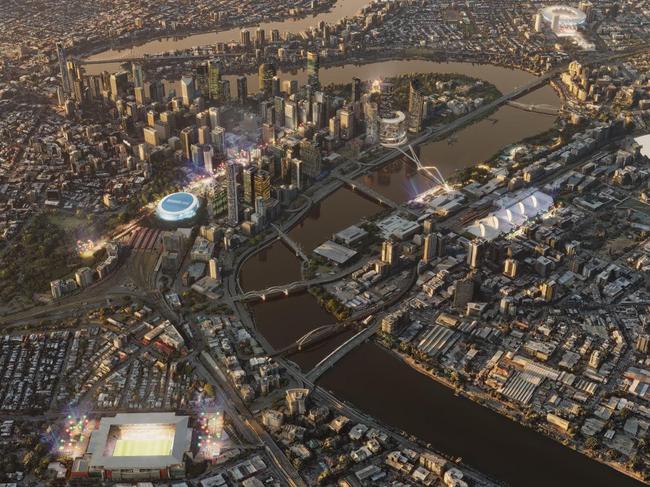What Brisbane will be like in 2032
With a booming population and the youngest Baby Boomers approaching their 70th birthday, this is what Brisbane will be like as it prepares to host the 2032 Olympic Games.
SEQ Olympics 2032
Don't miss out on the headlines from SEQ Olympics 2032. Followed categories will be added to My News.
There will probably be more than 6.5 million Queenslanders, the youngest Baby Boomers will be approaching their 70th birthday, we’ll be more accustomed to bikes and scooters than cars in inner Brisbane and a new generation will be starting to shape our world.
As Queensland prepares the decade long task of hosting the 2032 Olympics, it’s fascinating to speculate on just what the state will be like by the time the opening ceremony kicks off.
By 2032 the millennial generation will be giving way to generation “alpha,’’ the members of which will be flexing economic and cultural muscle as they move into their 20s, and begin deciding on what sort of world they wish to create.
Social researcher and futurist Mark McCrindle says Australia really has only two global cities at the moment - Sydney and Melbourne.

But by 2032, with Queensland’s southeast alone probably hosting a population well beyond 4.5 million, Brisbane will be a recognised global city, with a reputation about to be greatly enhanced by the looming Olympic Games.
Queensland has long been recognised as the place where Australians go for fun and holidays as well as where they go to retire, Mr McCrindle says.
“But by 2032 it will be recognised as a corporate powerhouse as well, and to some extent that is already happening.,’’ he says.
The city’s central business district, bounded and even somewhat confined by the Brisbane River, will have become a much more intensively populated precinct with far better public transport links which are already in the pipelines.
Those transport links will be enhanced and improved by the demands of the Olympics.
But McCrindle says the river city is also setting itself up as one of the world’s more walkable cities _ an appellation increasingly conferred on cities such as London, Paris and Hong Kong — and bikes and scooters will dominate.
Queensland’s population which stood at around 5.2 million at the start of the year is predicted by the State Government’s figures to grow to between 6.5 million people and 7.9 million by 2041.
While there are expected to be around 6.5 million Queenslanders by the time the Olympic Games is staged, demographers agree the Covid crisis could have an ongoing impact on population figures across the nation.
Last year, while southern states lost people, Queensland had its biggest population increase since 2004 with around 30,000 new people turning up.
If the trend continues, by 2032 Queensland which has around 20 per cent of the national population could overtake Victoria which has around 26 per cent of the population.
McCrindle says the Alpha Generation will have begun exerting a powerful influence on the way life is lived in 2032.
With the baby boomer generation widely regarded as having begun in 1946 and ended in 1964, the youngest Baby Boomers will be 68 as the Olympics arrive.
The oldest of the Alphas _ those born in 2010 who are following Generation Y (Millennials) and Generation Z into the world _ will be just 22.
By the time the Olympics crowds start arriving in Brisbane in 2032 the generation steeped in technology, and with much of their life experience gleaned from a computer screen, will be emerging from high schools and universities.
Knowing nothing of life without connectivity, and utilising technical developments not yet discovered, that generation will just be beginning to use their earning power to shape the economic and cultural landscape in ways we cannot imagine.




